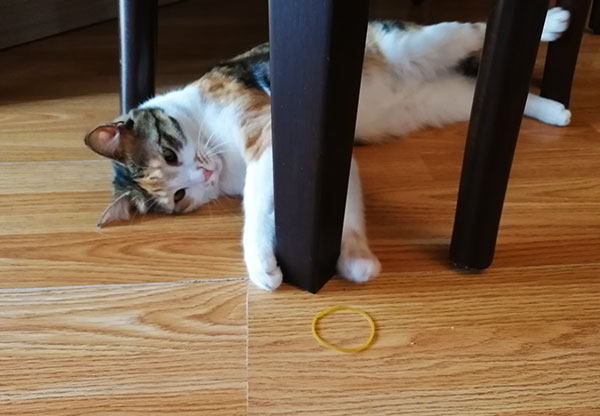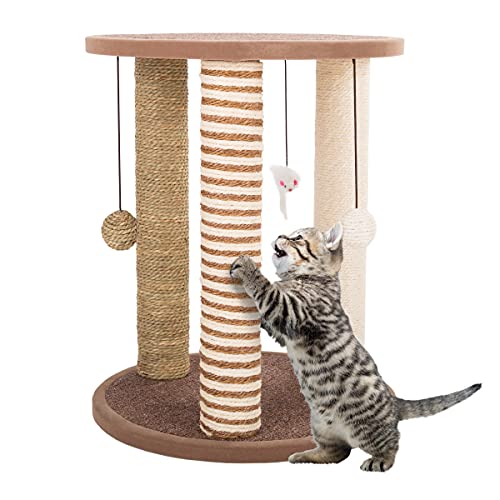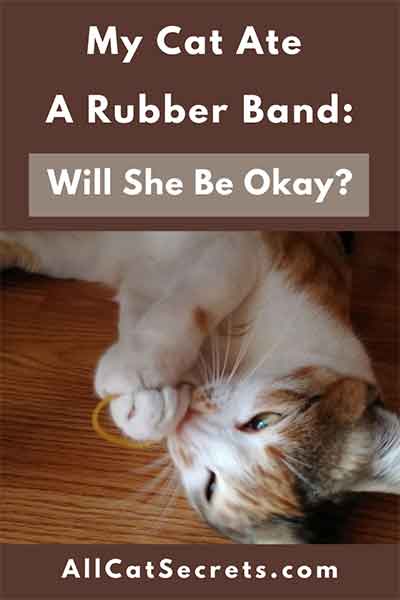Cats are incredibly smart animals who can often tell straightaway what’s safe and what’s potentially dangerous to them. But cats are also inherently curious and will not hesitate to check out anything in the house that doesn’t seem to belong.
If you accidentally dropped a rubber band near your cat’s favorite play area, you’ll soon discover your feline friend playing with it. As a cat owner, the sight of your kitto playing with a rubber band may not seem like anything out of the ordinary.
However, your cat may end up eating the rubber band, whether by accident or design. That’s especially true if it’s the first time the animal is coming into contact with a rubber band. As a responsible pet parent, that may get you wondering, ‘my cat just ate a rubber band, what should I do?’
For the most part, a rubber band should go down your cat’s stomach and come out the other end with no problems. So, there’s usually no cause for alarm if you discover that your kitto has swallowed a rubber band.
So, can cats eat rubber bands?
Now, we’ve just mentioned that a rubber band will unlikely harm your cat. But that doesn’t make rubber bands safe for cats either.
Depending on the size and amount of rubber band eaten, your cat could develop a host of life-threatening complications.
Plus, the mere fact that a rubber band is a foreign substance means that the presence of this object in your cat’s digestive tract will almost always induce some side effects.
Table of Contents
Why Do Cats Eat Rubber Bands?
It’s not unusual to come across a cat owner wondering, ‘my cat ate a piece of a rubber band, should I be worried?’
Usually, there’s no immediate cause for concern if your cat ate small rubber band. However, the situation suddenly changes if the animal has consumed huge chunks of rubber band. It’s worse if he ate the rubber band on an empty stomach.
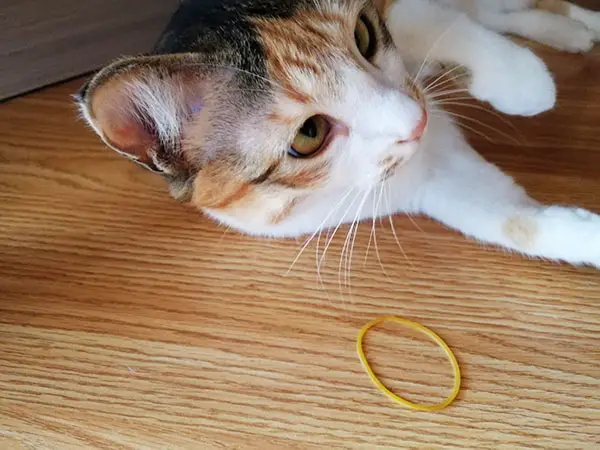
Also, the mere fact that a cat’s body considers rubber band as a foreign object means that you should definitely be worried if you suspect that your kitto has eaten rubber band. As you shall find, there are always some side effects to watch out for.
But before we highlight what could possibly go wrong if your cat ate rubber band, it’s important to understand whether cats are attracted to rubber bands in the first place.
Now, we began by mentioning that cats are inherently curious animals. As such, any unusual thing lying in their patch is likely to pique their interest. And that includes a rubber band. If your cat has never seen a rubber band before, he will surely develop an interest in the object, so much to want to play with it.
Another reason that could draw cats to rubber bands is the fact that cats have a strong prey drive. Note that rubber bands are considerably elastic and bouncy. As these elastic bands bounce off the floor, they mimic the movements of a prey, thereby triggering a cat’s prey drive.
- High protein formula, with real chicken as the first ingredient
- Fortified with guaranteed live probiotics to support digestive and immune health
- Crunchy kibble and meaty, shredded pieces for a delicious mealtime experience
Last update on 2025-02-16 / Affiliate links / Images from Amazon Product Advertising API
The following are other reasons why cats may be attracted to rubber bands;
1. Insufficient toys
The average cat sleeps up to 16 hours a day. In fact, most cats only stay awake when they need to eat, use the litter box, or play.
Since cats spend only a few hours a day playing, they need enough toys to make every playtime fun and lively. Which underscores the importance of investing in plenty of cat toys.
But quantity isn’t everything, the toys should also be interactive enough. That’s the only way to keep your cat distracted and entertained. The right cat toys can help to reduce cases of boredom and loneliness.
If ever your cat feels like he’s not getting his fair share of interactive toys, he may begin playing with objects he normally doesn’t show interest in, such as rubber bands. And that’s when your kitto may end up eating the rubber bands.
2. Certain Medical conditions
Any medical condition that causes your cat to develop compulsive behavior may also make him eat rubber band. Separation anxiety is one such illness.
Considered the most common feline mental disorder, separation anxiety results from prolonged periods of abandonment. If you’re always gone but do not make sufficient provisions for your cat’s physical and mental stimulation, it will only be a matter of time before the animal develops separation anxiety.
Some of the common symptoms of separation anxiety include;
- Intense anxiety, especially when you’re about to leave the house
- Overly-excited greetings
- Abnormal feeding habits, such as refusal to eat or overeating
- Unexplained digestive complications, including vomiting and/or diarrhea
- Abnormal litter behavior, such as peeing or pooing outside the litter box
- Insomnia
- Pacing
- Escaping behavior
- Self-destructive behavior, such as excessive chewing or scratching
Pica is another common medical condition that could cause your cat to eat rubber bands.
Unlike separation anxiety which is mostly a mental condition, pica is a compulsive eating disorder that could make your cat resort to all manner of weird behavior. The disease is mostly marked by strange eating habits, including eating inedible things like plants, wool, plastic bags, paper, electrical cords and of course, rubber band.
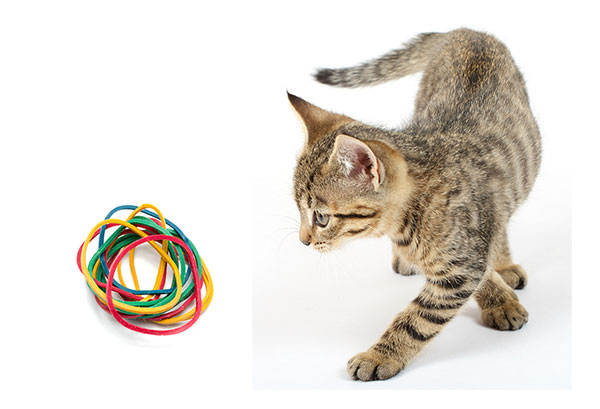
Is it bad if a cat eats a rubber band?
The fact that cats are attracted to rubber bands doesn’t make rubber bands safe for them. In fact, it only complicates the situation.
Ordinarily, you’d expect your feline friend to find rubber bands repulsive. That way, they wouldn’t be motivated to play with them, let alone eat them. The following section highlights some of the side effects of rubber bands for cats and what you can do to help your cat out.
What If My Cat Ate A Rubber Band?
Rubber bands are inedible, and cats have no business whatsoever swallowing inedible substances. But just what happens if your cat eats a rubber band?
Now, a cat’s digestive system is designed primarily to process meat. Anything other than animal-based foods will almost always trigger a host of gastrointestinal issues. The fact that a rubber band isn’t edible in the first place makes it even more potentially toxic for your feline friend.
Choking is the first thing that could happen if your cat ate a rubber band. It mostly occurs when the cat tries to swallow large chunks of rubber band. Some of the signs of choking to watch out for include irritability and dilated pupils.
However, note that many of the signs your cat ate a rubber band will show if the cat has already swallowed the substance.
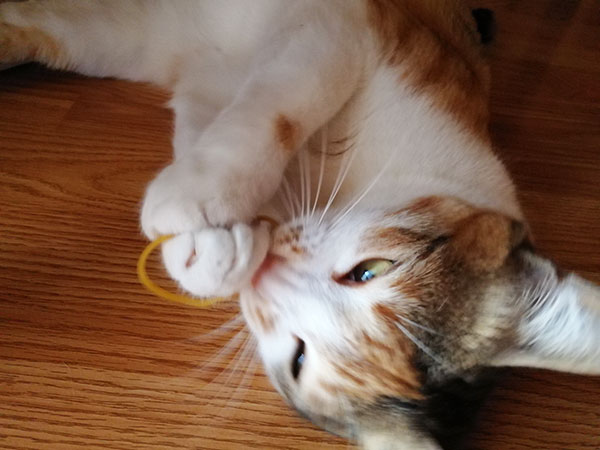
And that begs the question, can cats digest rubber?
Cats cannot digest rubber. Which means that all the rubber band pieces consumed by your kitto should come out through his anus undigested. But it’s the time that rubber bands take to come out of your cat’s body that should worry you.
When a rubber band gets to your cat’s stomach, it could lead to a medical condition known as intussusception. Intussusception occurs when sections of an animal’s intestines telescope inside another, leading to obstruction. The condition causes the intestines to continually rub against each other, resulting in tears and abrasion.
Without urgent medical intervention, intussusception could cause a rupture in your cat’s intestines, leading to excruciating pain. Besides pain, ruptured intestines may cause bacteria and parasites to flow from the animal’s stomach to his bloodstream, opening him up for a range of infections.
Necrosis is another serious complication that could occur if your cat ate rubber. Like intussusception, necrosis first develops due to blockage in your kitto’s digestive tract. The blockage affects the flow of blood and nutrients to adjacent organs and tissues, leading to their eventual death. Once a body tissue or organ dies, not even surgery can repair the damage caused.
The following are some of the symptoms of intussusception and necrosis;
- Nausea and vomiting
- Loss of appetite
- Constipation
- Diarrhea, which might lead to dehydration
- Dehydration symptoms like dry eyes and infrequent urination
- Abdominal discomfort
- Restlessness
- Fever
- Aggressive behavior, especially when you try to touch the cat’s abdomen
- COZY CAT SCRATCHER - Ensure kittens and cats have ample room to sharpen claws without using your furniture with this cat...
- HOURS OF PLAY - Keep felines occupied while at the office or working from home with cat accessories like these scratching posts...
- STURDY DESIGN - Construction from sturdy materials help these cat accessories for indoor cats endure kitties with mischief on...
Last update on 2025-02-16 / Affiliate links / Images from Amazon Product Advertising API
Can A Cat Die From Eating A Rubber Band?
Death resulting from cats eating rubber bands are rare. However, the medical complications that rubber band may trigger in your cat’s stomach might lead to death if not addressed with the urgency they deserve. For instance, necrosis of vital organs like the pancreas or duodenum might kill your cat in a matter of days.
How to Treat Cat Who Ate Rubber Bands
As a caring pet parent whose cat has just consumed rubber band, it’s not unusual to find yourself wondering, ‘my cat ate a rubber band, will he be okay?’
Although we’ve already stated it, there’s no harm in repeating that small bits of rubber band will unlikely harm your cat. But based on the potential risks of rubber bands for cats that we’ve just highlighted, it’s also important to prepare yourself for the worst.
The good news is that there are numerous ways to treat a cat that has eaten rubber band. So, if you ever find yourself wondering, ‘my cat swallowed a rubber band, what do I do,’ well, the following are some of the tips to go about the situation.
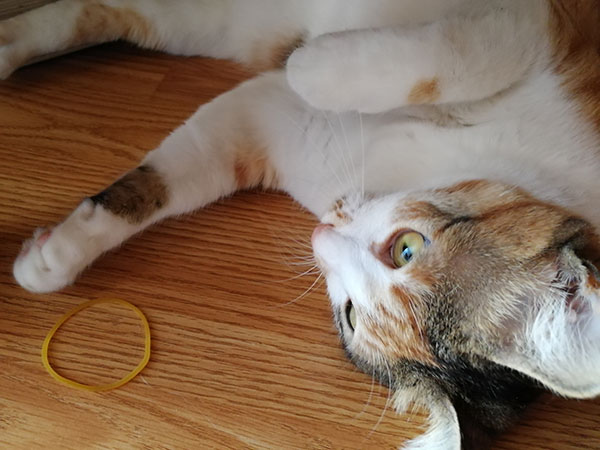
1. What to do if your cat has eaten but not yet swallowed a rubber band
If you suspect that your cat has eaten a rubber band, the first thing to do is open and check the animal’s mouth for evidence. If the rubber band is not yet swallowed, pull it out gently using your fingers.
Pulling rubber bands manually from your cat’s mouth will not only save the cat’s life. It will also save you from incurring medical expenses if the incident results in a visit to the vet.
Just remember to be gentle with the cat’s mouth to avoid getting bitten.
Another precaution to take is to check if the rubber band has twisted and anchored itself to the internal structures of your cat’s mouth, such as his teeth or the base of his tongue. In this case, do not attempt to remove the object manually. Doing so could result in cuts or sears to the lining of the cat’s mouth and food pipe. The same precaution should be observed if the rubber band has been partially swallowed.
- Perfect for Big Cats and Multi-Cat Homes: The Modkat XL Litter Box is designed for large cats and households with multiple feline...
- Versatile Entry Options to Suit Every Cat: Configure as a top-entry to keep floors clean and minimize spillage, or use as a...
- Walk-Off Lid Keeps Your Floors Clean: The top-entry lid doubles as a walk-off mat, effectively catching stray kernels to keep your...
Last update on 2025-02-17 / Affiliate links / Images from Amazon Product Advertising API
2. What to do if your cat has already swallowed a rubber band
It’s your hope that your cat never eats rubber band in the first place. But should it happen that the cat has already eaten rubber bands, you should pray that you catch the animal with the substance still in its mouth.
You don’t want a rubber band to go down your cat’s food pipe, less so if the pieces consumed are dangerously large. In the worst-case scenario, you could be looking at a range of full-blown infections, including intussusception and necrosis. That’s mainly due to the long duration it takes for inedible substances like rubber band to pass through your cat’s alimentary canal.
But how long does it take for a cat to pass a rubber band?
Well, there’s no fixed duration it takes for cats to pass rubber band, as that mostly depends on the animal’s bowel activity. However, the duration is definitely longer than that taken to pass edible substances.
The convention is to check your cat’s litter box after every use for the next 24 hours. If the pieces of ingested rubber bands don’t interfere with your kitto’s bowel movements, you can expect to see rubber band in your cat’s poop within 24 hours.
As you wait for the 24-hour window to elapse, try to feed the cat foods that generally increase bowel activity. For instance, fiber-rich foods tend to bulk up stool, making an animal empty their bowels more frequently than they usually do. The same goes for laxatives. So, you might consider giving your cat mineral oil, such as olive oil, to help push the ingested rubber bands through his alimentary canal.
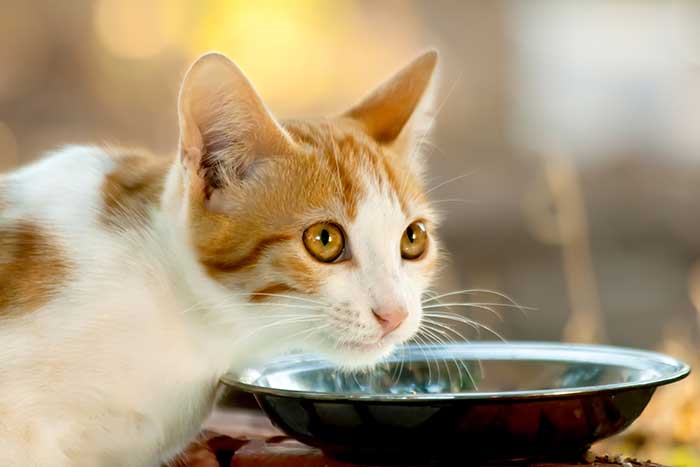
Since your cat may find the smell or taste of mineral oils quite repulsive, the best way to administer these laxatives is by using a feeding syringe or eyedropper. Most importantly, administer the oils in moderation to prevent them from wreaking havoc in your cat’s stomach.
3. What to do if the swallowed rubber bands pop out in your cat’s anus
As soon as you notice rubber bands popping out of your cat’s anus, pull them out using your fingers. It’s important to ensure that every bit of the material comes out.
To do that, you’ll need to know exactly how much rubber band your cat ingested. Otherwise, continue administering mineral oils and fiber-rich foods to allow the animal to empty his bowels completely.
Can Kittens Eat Rubber Band?
As a caring cat owner, you may often wonder, ‘my kitten ate a rubber band, what should I do?’
Note that anything that could go wrong with adult cats will most certainly go wrong with kittens. So, if rubber bands are potentially harmful to cats, then kittens should definitely not eat them.
The best thing to do if your kitten has eaten rubber bands is to visit the vet immediately.
- Real turkey is the number 1 ingredient in this Purina indoor cat food to help provide the protein she needs for strong muscles,...
- High protein cat food kibble with 10 percent less fat than Purina ONE Tender Selects Blend With Real Chicken helps her maintain a...
- A SmartBlend of fiber-rich nutrition in weight control dry cat food helps minimize hairballs, and four antioxidant sources support...
Last update on 2025-02-16 / Affiliate links / Images from Amazon Product Advertising API
So, Can Cats Eat Rubber Band?
Although rubber band is an indigestible substance, there shouldn’t be immediate cause for concern if your cat eats small amounts of it. That’s because the substance will simply pass through his digestive tract and come out safely via his anus.
So, maybe you’re wondering, ‘my cat ate half a rubber band, will this cause problems?’
As we’ve mentioned throughout the post, smaller amounts of rubber band will unlikely cause any problems for your kitto.
However, if your cat happens to have ingested huge chunks of rubber band, it’s advisable to take action immediately. Try to extract the rubber bands from the cat’s mouth if he is yet to swallow them.
If the substance has already been swallowed, give the animal stool-bulking foods so he can poop the rubber bands fast. And should your interventions come to nothing, seek professional help immediately.
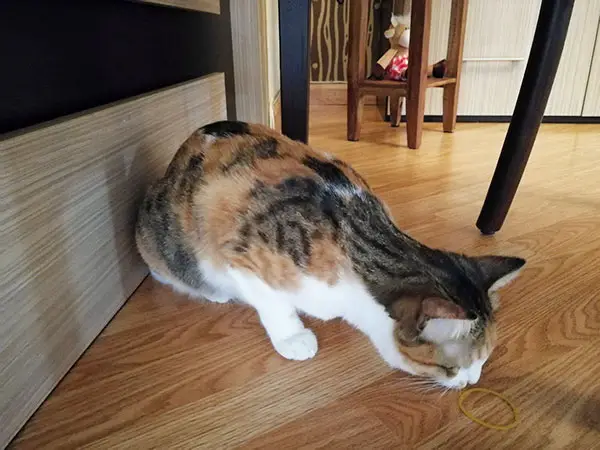
Checkout Our Favorite Cat Products
1. Best Online Course For Cat Parents
Our favorite: The Cat Language Bible (How to Finally Understand And Speak to Your Cat) – A new form of cat to human communication that many cat owners have dreamed about… but few have actually thought possible.
2. Best Immune Support For Cats
Our favorite: Tomlyn Immune Support – Best Supplement for Cats and Kittens.
3. Best Cat Treats
Our favorites: LIFE ESSENTIALS All Natural Freeze Dried Chicken And Sheba Meaty Tender Sticks – Both are Great.

